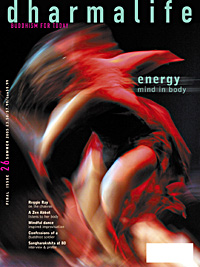The Dharma of Dragons and Daemons
Buddhist Themes in Modern Fantasy
David R Loy and Linda Goodhew
Wisdom Publications 2004, $14.95/£10.95p/b, 155pp
Like every other culture, modern culture is underpinned by the transmission of stories. In this accessible, brief book the authors set out to illuminate the value of several well known modern fantasy fiction works from the perspective of practising Buddhists.
The book explores J.R.R. Tolkien's Lord of the Rings, Philip Pullman's His Dark Materials trilogy, Ursula Le Guin's Earthsea series, Michael Ende's Momo, and Hayao Miyazaki's anime films Nausicaa of the Valley of the Winds and Princess Mononoke. I wondered if such a short book could possibly deal with such epic works, and yet somehow it does.
No doubt someone will attempt a full Buddhist analysis of Tolkien's fiction at some point; I suspect it will be a footnote-heavy academic thesis that might kill the thing. Loy and Goodhew bring an intelligent sensitivity to these precious narratives; they obviously love the stories, and their discussion comes from the heart. They don't try to over-explain or force Buddhist ideas onto the text. 'Gandalf cannot accompany Frodo and Sam all the way ... no matter how wise and compassionate our teachers may be, they cannot walk the path for us.' Loy and Goodhew heed their own advice and lead us to the point where we can continue our own adventures into the chosen texts. The reason Frodo is the only one who can carry the Ring all the way is that he is selfless, he doesn't even want to go on the adventure and would give the Ring away if he could. But he risks his life and Middle Earth is saved from its dark oppression. Hence Frodo, despite being an everyday non-heroic hobbit, is actually a Bodhisattva. Further Buddhist concerns include karmic conditioning in Middle Earth, the unbalancing effects of selfish power, fear of death and thus desire for immortality (the Ring prevents decay).
For me the most satisfying chapter is the one on Michael Ende's Momo, perhaps the least well known of the books covered. Momo is a clever story about saving and stealing time. The 'grey men' want everyone to save time in a time bank. But as a result people rush around in an ever more utilitarian manner - the more time is saved, the less there seems to be. This prompts Loy and Goodhew to a Buddhist discussion of time with particular reference to Dogen whom they succinctly paraphrase: 'What I do and what happens to me are not events that occur in time; they are forms that my being-time takes. If I am time, though, I cannot be trapped by time. Paradoxically, then, to be time is to be free from time.'
While admiring his books, Pullman is criticised for reducing the problem of life to 'getting rid of our sense of sin' - meaning that his anti-religious stance falls short of a convincing alternative myth. The authors believe that 'from a Buddhist perspective [Le Guin's] novels provide perhaps the most profound and moving fantasy series of our time', suggesting that 'Earthsea's wizardry is similar to our modern technology. Both are used to control and deny death.' The chapter on Miyazaki's anime films deal with non-violence (in the otherwise pretty aggressive medium of Japanse manga). None of these works have explicit Buddhist references. Perhaps therein lies the power of creative myth and a key to future Dharma-implicit fiction.
Padmakara's rendition of the Udana - Verses of Inspiration was published by Windhorse in 2003



